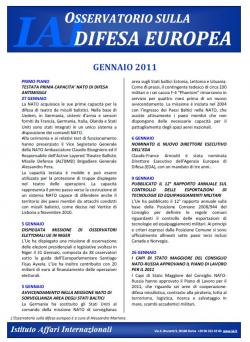Observatory on European defence, October 2003
4 October 2003
European Defence Ministers Informal Meeting - Agency, Missions, Capabilities
An EU Defence Ministers informal meeting was held in Rome on 4 October.
Ministers discussed EU-NATO relations, and in this framework expressed their desire for the EU to take over the NATO SFOR mission in Bosnia in 2004.
Another central issue was the European Defence Agency (agency for armaments), which should be started up at the intergovernmental level, with a broad mandate and the direction of the High Representative, by the end of 2003.
Ministers are in favour of the institution of a European Military Police Corps, based on the model of the Italian Carabinieri and the French Gendarmes.
Moreover, specific positions came out over the possibility of creating a new European Headquarters: according to the UK a new European cell within the Shape (Supreme Headquarters Allied Powers, Europe) should be constituted; Belgium, France, Germany and Luxembourg prefer an autonomous command (also opposed by the United States).
Italy proposed a compromise solution: national commands integrated with a multinational component.
16-17 October 2003
European Council - Capabilities, Institutions, Iraq
The European Council widely discussed several issues of EU defence policy, including the lack of military capabilities.
Many interventions were focused on relations with NATO to assure coordination and complementariness between the two institutions.
The Treaty’s main innovations - introduced by the Convention and now under examination by the IGC (Intergovernmental Conference) - were discussed.
An arrangement supporting the introduction of Structured Cooperation was proposed in the field of defence, on condition that they remain open to all members. The mutual defence clause seems to be opposed by several countries, especially the UK but also some ‘neutrals’ (especially Austria, Finland and Ireland).
Moreover, the Council once again discussed policy towards Iraq following the adoption, on 16 October, of UN Resolution 1511.
21-22 October 2003
EU-NATO - NATO Evolutions
An informal meeting gathering the institutional summits of the EU and NATO was held in Brussels.
The creation of an independent European command created tension among European countries and came up against US opposition to the project.
NATO and the US complained of a perceived lack of information on European defence initiatives.
The meeting between the two institutions followed a series of events within the Atlantic Alliance that determined:
- the revision of the ISAF (International Security Assistance Force) mission in Afghanistan, with the 6 October NAC (North Atlantic Council) decision, taken up in a Security Council Resolution on 13 October, to extend the mission beyond Kabul.
- the achievement of the initial operational capability of the NATO Response Force on 15 October.
October 2003
Europe - Iraq
The Iraqi question was once again the main issue on the EU agenda in the month of October.
On 13 October, the External Relations Council adopted a document that confirms that the EU will try to involve the UN and the Iraqi people more in the stabilization process, as well as its economic support (200 million euro in the 2003-2004 period).
On 16 October, the UN Security Council unanimously adopted Resolution 1511, which establishes an institutional framework for the stabilization of the country, assured by a US-led multinational force, and opens up to collaboration with the UN and to contributions from other countries for the reconstruction, even if it does not fix a set date for the Iraqi people’s take over of power.
On 16 October, the Iraq Donors’ Conference was held in Madrid. Several European countries (including France and Germany) did not promise any contributions.
European Community financing for the first year seems limited to 200 million euro, in addition to the contributions of single members (a total of 500 million), and the 700 million already allocated.
-
Details
Roma, Istituto affari internazionali, 2003 -
Issue
03/10



